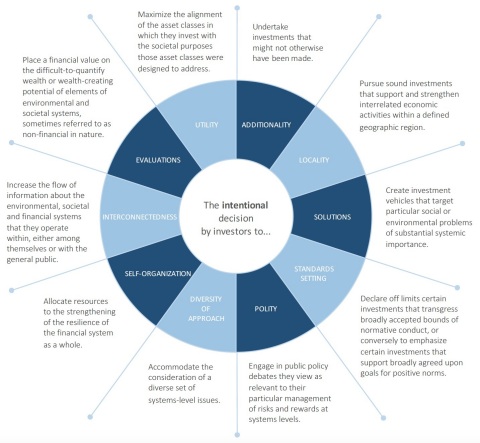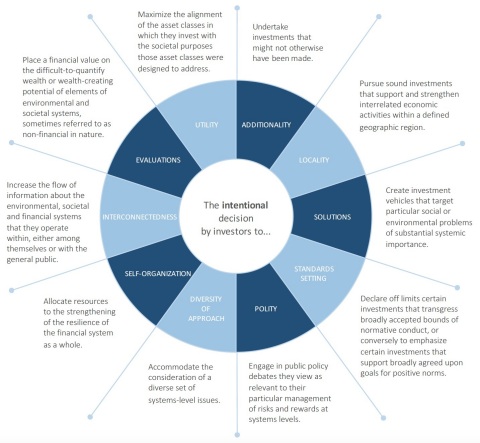NEW YORK--(BUSINESS WIRE)--A new state-of-the-industry report finds that investors are deliberately incorporating new investment approaches to help address systems-level risks and opportunities. The study indicates that investors are intentionally attempting to influence systems-level risk factors previously ignored as beyond the impact-ability of institutional investors.
The report identifies ten tools through which 50 major institutional investors, with some $17.3 trillion in aggregate assets, are deploying “intentional, systems-level investing.” The report also offers specific examples of investors working to impact global challenges including financial system sustainability, climate change and human rights issues.
The new study, Tipping Points 2016: Summary of 50 Asset Owners’ and Managers’ Approaches to Investing in Global Systems, examines how 28 asset owners and 22 asset managers are beginning to think about the impact of their investments and, in turn, how those investments are affected by global environmental, social and financial systems. This new systems-level thinking is additive to traditional investment scrutiny at the security and portfolio levels. Supported by the Investor Responsibility Research Center Institute (IRRCi), the report is authored by William Burckart, Steve Lydenberg and Jessica Ziegler with The Investment Integration Project.
A webinar is scheduled for Tuesday, November 15, 2016, at 12 PM ET to review the findings and respond to questions. Register at no charge here. Download the full report here.
“It has been more than a half century since Harry Markowitz popularized diversification and portfolio level investing, for which he later won a Nobel Prize. Since then, capital markets around the world have changed dramatically, and the global financial crisis was a game changing wake-up call. Against this dynamic backdrop, investors are evolving and realizing that global financial, environmental and social systems have major ramifications on their investments and, simultaneously, their investments have deep impacts on those systems,” said Jon Lukomnik, IRRCi executive director.
“The report illustrates the new policies and practices that investors are embedding into their business culture and investment strategies. We now have concrete evidence that investors are intentionally confronting global environmental, social and financial systems challenges in a way that makes financial sense,” Lukomnik explained.
“A lot of work is left to be done to better understand the complex relationship between systems and portfolios. But, this study demonstrates that institutional investors, whether implicitly or explicitly, understand that the world is becoming increasingly interconnected,” said report co-author William Burckart.
“Previously, investors could find ways to insulate their portfolios from certain global events. Today, even seemingly ‘local’ events can immediately and adversely affect all portfolios. Because the largest and most influential investors are recognizing this trend and beginning to consider the connection between planetary systems under stress and adversely effected portfolio performance, we are looking at a potentially critical shift in the evolution of investment,” Burckart observed.
The report highlights several investor examples in the U.S. and abroad:
- PGGM, the Dutch pension fund manager, has allocated a multi-billion dollar portion of its assets to what it describes as a “solutions” portfolio focused on four issues: climate change, food, healthcare and water.
- The Ireland Strategic Investment Fund invests in enterprises “in a manner designed to support economic activity and employment in Ireland.”
- To contribute to the vitality of Montreal, the regionally focused Caisse de dépôt de Québec has invested in a combination of public transportation and downtown office buildings and hotels.
- The largest investor in the world, BlackRock, has created an impact division to design bespoke investment programs and has made a name for itself through its investment stewardship program which has taken a long-term, sustainability approach for all its portfolio companies.
- The New York State Common Retirement System has worked with Goldman Sachs to create a low-carbon equity index fund to which it has allocated $2 billion.
- The California State Teachers Retirement System has allocated $2.5 billion to an MSCI low-carbon index fund, and also has worked with the NGO Ceres to query 45 fossil fuel companies about their strategic plans under various energy/climate scenarios.
One of the most important findings of the report is the identification
of ten tools through which investors express this intentionality:
Please
see multimedia above for further information.
Download the full study here. Register for the webinar at no charge here.
The Investor Responsibility Research Center Institute is a nonprofit research organization that funds academic and practitioner research enabling investors, policymakers, and other stakeholders to make data-driven decisions. IRRCi research covers a wide range of topics of interest to investors, is objective, unbiased, and disseminated widely. More information is available at www.irrcinstitute.org.
The Investment Integration Project helps institutional investors understand the feedback loops between their investments and the planet’s overarching systems – be they environmental, societal or financial – that make profitable investment opportunities possible. Once this relationship is understood, TIIP provides investors with the tools to help manage the impacts of their investment policies and practices on these systems. More information is available at http://tiiproject.com/




